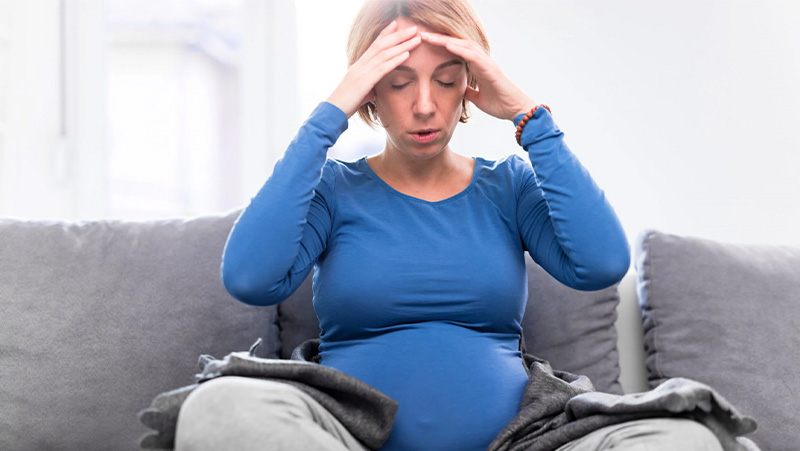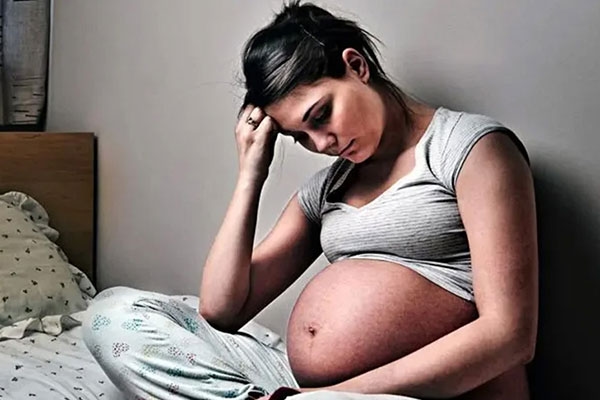Feeling low or stressed is a normal part of any pregnancy journey. If you are feeling low or sad for weeks or months, it could be a sign of pregnancy depression. Dealing with depression can be tough in regular life itself, but in pregnancy, things can become even more difficult.
Remember, depression is an illness, and every illness has a cure. However, you are not alone in this journey. Therefore taking care of your emotional and mental well-being as important as your physical health.
Prenatal Depression— What is It?
Prenatal or pregnancy depression is when you feel low or depressed during pregnancy. Being pregnant brings a lot of changes to your body, and these changes can be stressful, making you feel depressed. It can affect how you see and feel things.
You just need to accept the fact that this is all normal when you are pregnant. However, do not hesitate to talk to your healthcare provider when you feel things are getting out of control. It is important to get the right treatment at the right time as pregnancy depression can sometimes lead to postpartum depression after your delivery.
What Causes Pregnancy Depression?
- Having a medical history of depression or premenstrual dysphoric disorder (PMDD).
- Not having many people around for support
- Your age when you conceive– if you're younger, there might be a higher risk.
- Living by yourself.
- Having problems in your marriage.
- Feeling unsure about your pregnancy.
Remember stressful situations are the leading causes of going into depression.
Who is More Prone to Prenatal Depression—Are You at a Risk?
Pregnancy depression can affect almost any expecting mother. You might be more likely to experience it if you or your family has a history of—
- Panic disorder.
- Anxiety disorders.
- Depression and postpartum depression.
- Obsessive-compulsive disorder (OCD).
It can also be seen commonly in people—
- Going through stressful events like divorce, health problems, money troubles, or work issues.
- Expecting a child with health issues or special needs.
- Who did not plan their pregnancy.
- Having twins or triplets.
- Facing challenges while trying to get pregnant due to infertility.
Signs and Symptoms
Feeling worried, sad, or maybe anxious is completely normal during pregnancy. But if you have depression, getting over these same emotions might be difficult. Signs of depression during pregnancy can include—
- Feeling sad, anxious, worrying a lot, and having strange thoughts.
- Visible changes in your weight and appetite.
- Losing interest in things.
- Avoiding friends, family, and social activities.
- Feeling tired all the time, sleeping a lot, or having trouble sleeping (insomnia).
- Being easily irritated, crying a lot, or having big mood swings.
- Losing interest in connecting with your partner.
- Having physical problems like muscle aches, headaches, or stomach issues without a clear cause.
- Trouble remembering things, concentrating, or making decisions.
In severe cases, women with pregnancy depression can even think about hurting themselves or their unborn child. If you ever get thoughts of hurting yourself, call for emergency help right away.
Can Pregnancy-Related Depression Hurt My Baby?

If depression during pregnancy is not taken care of, it can be harmful for both the mother and the child. Not getting the right treatment at the right time for depression might lead to problems like consuming alcohol during pregnancy, smoking, eating junk, and even thinking about hurting oneself also resulting in the preterm labor or premature birth of the baby.
When you’re feeling depressed, you might not want to look after yourself and the baby growing inside you. It is seen that babies born to mothers who are depressed might not be as alert, energetic, and happy as babies born to moms who are happy.
Pregnancy Depression Treatments
If you think you might be dealing with pregnancy depression, the first thing to do is get help. Talk to your doctor about the same.
Remember, they care about you and your baby and can talk to you about different ways to deal with pregnancy depression, like—
- Having private talks with a therapist
- Joining support groups
- Trying out medication
- Getting some quality sleep to feel refreshed
Also, Prenatal depression can lead to Insomnia during pregnancy but getting rest and some quality sleep is important for your body and mind to handle stress and daily challenges. Experts suggest getting a cozy and comfortable sleep environment might help.
Try using an Eli & Elm pregnancy body pillow if you face problems while lying down or wake up with a backache or any kind of discomfort. Pregnancy pillows can help alleviate pain and discomfort if any.
ELI&ELM SPECIAL OFFER!
However, if required they can use different procedures to treat your depression like–
Medications:
Your doctor might prescribe certain medicines and pills to treat depression that are safe during pregnancy and breastfeeding.
Interpersonal therapy (IPT):
This therapy helps you build relationships with strangers by improving your interaction skills so that you can easily ask for help and support from social groups.
Cognitive-behavioral therapy (CBT):
CBT works on your imagination. It helps you to stop overthinking. As you continue with the therapy, you will learn positive thinking and different ways to handle situations without stressing too much.
Psychotherapy (talk therapy):
Talk therapy is all about discussing your feelings and finding a solution for it. An experienced therapist can help you handle mood swings so you start feeling better.
How to Prevent Pregnancy Depression on Your Own— Natural Remedies
Some natural remedies to help you get over pregnancy depression may include—
- Certain foods like sugar, caffeine, artificial additives, processed carbohydrates, and low protein may increase mental and physical health issues. It can also trigger your mood swings when pregnant. Get a healthy diet for your and your child's well-being.
- Engaging in physical activity and workouts helps you manage your stress level.
- Recent studies suggest that acupuncture can be a beneficial option for treating depression in pregnant women.
- Omega-3 supplements, particularly from fish oils, can help decrease symptoms of pregnancy depression.
- Various herbal and prenatal vitamins can help boost the serotonin hormone and reduce stress and depression.
The Bottom Line

If you are an expecting mother, feeling low or emotional is normal. But if those feelings are affecting your daily life, do not hesitate to talk to your healthcare provider. Sharing your symptoms and feelings openly with your doctor is a must. If you ever think about hurting yourself or your baby, get emergency help right away.
Remember reaching out for help is a sign of strength, not weakness. Both your and your baby’s well-being is what matters the most.
Sources:
Cleveland Clinic: Prenatal Depression












